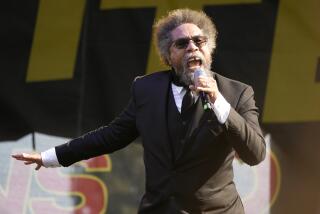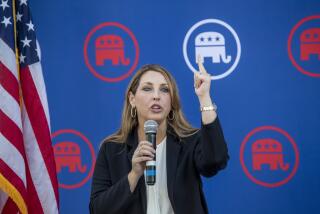Teamster Chief Is Barred From Reelection Bid
- Share via
Teamster leader Ron Carey, who rose to power as a reformer pledging to root out corruption in his trouble-plagued union, was disqualified Monday from running for a new term as president because of his alleged involvement in a far-reaching campaign finance scheme.
A court-appointed overseer, former federal judge Kenneth Conboy, concluded that Carey lied when he told investigators he was left in the dark about the 1996 fund-raising conspiracy and, in fact, willingly participated. The conspiracy already has led to guilty pleas to federal charges by three former Carey associates, and the U.S. attorney’s office in New York is investigating possible wrongdoing by Carey and other top AFL-CIO officials, leading Democratic fund-raisers and other political groups in connection with the scheme.
Conboy’s decision leaves Carey rival James P. Hoffa as the only standing contender for the helm of the nation’s biggest private-sector union.
But the latest twists in the complicated Teamsters election drama also threw a wrench into the campaign plans of the Detroit-based Hoffa, the 56-year-old son of legendary Teamsters President James R. “Jimmy” Hoffa. Along with ruling against Carey, Conboy instructed Benetta Mansfield, the election officer currently supervising the Teamsters election, to “fully investigate” the Hoffa campaign’s finances.
All told, the developments at least temporarily leave Carey at the helm of the 1.4-million-member union and are nearly certain to postpone a monthlong rerun election now scheduled to end March 17. Conboy’s actions also could give the Carey camp extra time to choose and coalesce behind a new candidate for president.
The 61-year-old Carey, first elected Teamsters president in 1991, vowed to contest Conboy’s decision. Carey attacked the credibility of Conboy’s witnesses and asserted: “I have done nothing wrong, and I will fight this decision until it is overturned.”
But Hoffa, who arrived in Detroit Monday afternoon after a West Coast campaign visit, told reporters at a news conference at an airport hotel that “this is a day of vindication.”
Referring to Carey, Hoffa said: “It is absolutely shocking that he had the temerity to call himself a reformer while he was stealing from the union.”
Hoffa, consistently portrayed by the Carey camp as a throwback to corrupt Teamster leaders of the past, added that he “welcomed scrutiny” of his campaign finances and predicted that former Carey backers would come to his side.
In his 74-page decision, Conboy faulted Carey for “extraordinarily serious misconduct.” He said Carey “tolerated and engaged in extensive rules violations in broad furtherance of his reelection campaign. Specifically, Mr. Carey misused his union power in the course of the election by authorizing the expenditure of $735,000 in IBT [International Brotherhood of Teamsters] general treasury funds to help his flagging campaign.”
Conboy’s report also provided new details on how the campaign organization set up to help Carey win reelection to a second five-year term as union president went awry. As previously reported, the plan was directed by Carey associates late last year after Hoffa appeared to be drawing even in their initial election contest. Although Carey ultimately won the vote by a 52%-48% margin in December, the results were voided and a rerun election ordered when the fund-raising scandal came to light.
At the heart of the scheme was a money-laundering operation that diverted funds from the Teamster treasury and eventually routed a portion back to the Carey campaign.
In all, Conboy’s report found, the Carey campaign diverted $885,000 in Teamster funds to make political contributions to the advocacy groups Citizen Action, the National Council of Senior Citizens and Project Vote, along with the national AFL-CIO. In exchange, officials with those organizations or wealthy supporters of the groups contributed $327,500 back to the Carey reelection effort.
Further allegedly illegal contributions to the Carey campaign--from employers and their spouses, officials at the AFL-CIO and two of its big member unions, and from prominent New York labor lawyer Theodore Kheel--brought the illicit funds received by the Carey camp to $538,100, Conboy said.
In addition, Conboy found that Carey aides conspired with officials at the Democratic National Committee and the Clinton-Gore ’96 Reelection Committee to arrange another illegal fund-raising scheme, but no money was raised through that effort. Democratic officials have denied any knowledge of wrongdoing.
Both publicly and in appearances before investigators, Carey repeatedly had portrayed himself as unaware of any illegal transactions and claimed he had been betrayed by his aides.
But Conboy said he found Carey’s testimony “not credible for several reasons” and cited statements by three witnesses who indicated that they “discussed with Mr. Carey important information related to certain of these improper schemes.”
One of the witnesses was Jere Nash, who was Carey’s campaign manager and who pleaded guilty in September to the conspiracy in federal court. The other witnesses cited were Monie Simpkins, Carey’s executive secretary since 1993, and William Hamilton, the former top lobbyist for the Teamsters.
Nash’s comments appeared to be the most damaging.
For instance, according to Nash, Carey personally called Terry McAuliffe, an official in the Clinton-Gore campaign, to thank him for his fund-raising help.
*
On another occasion in mid-October 1996, Nash said that he talked with Carey after the Teamsters president denied an initial contribution to Citizen Action. Nash reported that Carey later reversed himself and approved the contribution after being told that it would help the fund-raising effort for Carey’s own reelection campaign.
What’s more, Nash said he regularly discussed with Carey a “multi-page fund-raising chart documenting the various sources of funding for the Carey campaign.”
Conboy, for his part, wrote that Carey testified that he has no memory of authorizing any of the contributions involved in the money-laundering enterprise, including payments totaling $475,000 to Citizen Action. Noting that the contribution was more than eight times larger than what the Teamsters gave the group in past years, Conboy said: “I find it unbelievable that Mr. Carey would have no recollection of ever having discussed that $475,000 contribution with Mr. Nash, Mr. Hamilton or Ms. Simpkins.”
But Hoffa, who urged federal authorities to remove Carey immediately, now will see his campaign undergo new scrutiny by union election officials.
Conboy called for officials to look into, among other issues cited by the Carey camp, the $1.8 million in unidentified contributions raised by the Hoffa campaign. Hoffa officials have contended the $1.8 million came from 20,000 individuals who provided no more than $100. Contributions of that size need not be individually reported under the election rules.
Carey backers inside and outside the Teamsters have long said that a Hoffa victory could return the union to the corruption of its past--a charge that the Hoffa camp vehemently denies.
Three of Carey’s six immediate predecessors--including the elder Hoffa--went to prison, and a fourth died while under indictment. Federal authorities are working with union officials to rid the union of organized crime influence under a historic 1989 consent degree stemming from a racketeering lawsuit filed by the government.
Under Carey, a former truck driver for the United Parcel Service of America, 390 allegedly corrupt local leaders have been removed or sanctioned.
Silverstein reported from Los Angeles and Nauss reported from Detroit.
More to Read
Get the L.A. Times Politics newsletter
Deeply reported insights into legislation, politics and policy from Sacramento, Washington and beyond. In your inbox twice per week.
You may occasionally receive promotional content from the Los Angeles Times.










